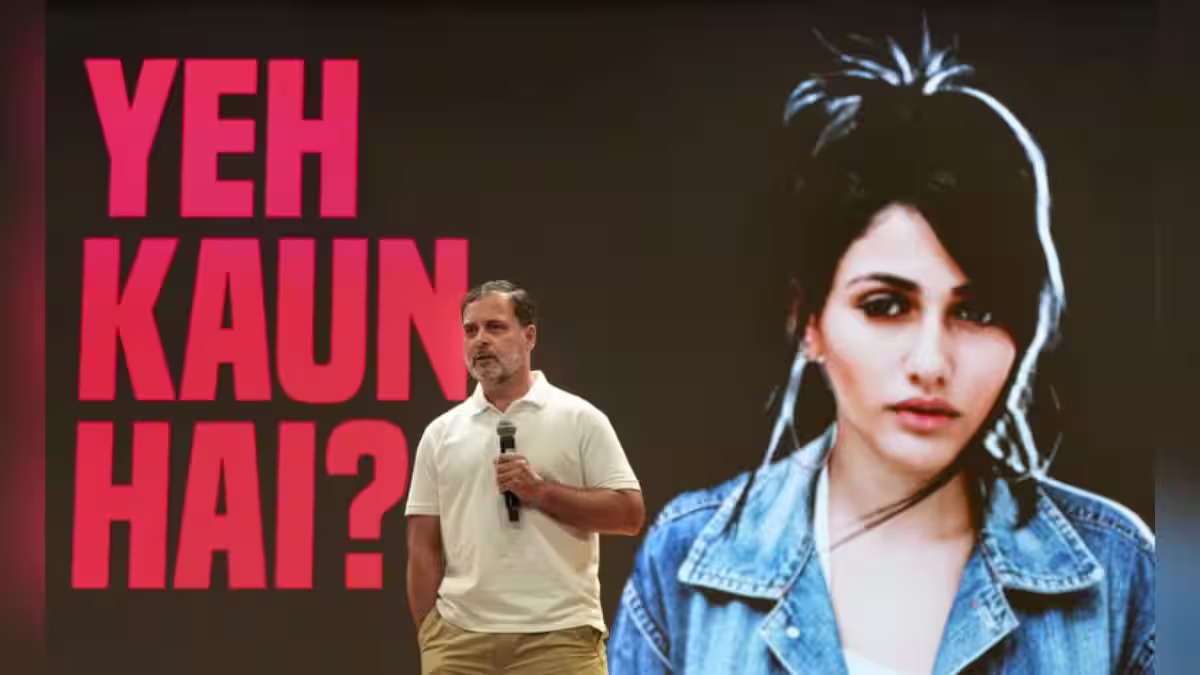From Brazil to Haryana: The Unlikely Tale of a Model’s Photo in Bharatiya Polls
“Unraveling the Larissa Voter Photo Controversy: Examining the Facts Behind Rahul Gandhi’s Vote Duplication Claims in Haryana.”
Paromita Das
New Delhi, 7th November: As Bihar’s assembly elections kick off in November 2025, Rahul Gandhi has intensified his narrative of electoral malpractice with renewed allegations of large-scale voter fraud in Haryana’s 2024 Assembly elections. Central to his claims is the sensational example of Brazilian model Larissa’s photograph reportedly used 22 times in Haryana’s voter lists, suggesting a massive orchestrated deception. Yet, a closer investigation of one such voter, Poonam from Rai constituency, reveals a far more complex and contradictory reality.
The Poonam Paradox: Reality Versus Claims
Among the voters Rahul Gandhi cited was Poonam from Sonipat district’s Rai Assembly constituency, whose photograph in the voter list was allegedly replaced with that of a Brazilian model. Contrary to Gandhi’s claim, a journalistic team visiting Poonam’s village found that her actual voter ID card bears her own photograph, matching the Electoral Photo Identity Card (EPIC) number Gandhi displayed. Poonam’s family, including her husband Sonu and village sarpanch, confirmed that this ID has been in use since 2012 and that Poonam voted with it during the 2024 elections. This finding raises critical questions about the validity of Gandhi’s evidence and the source of his information regarding the photograph mismatch.
Larissa’s Unexpected Role in a Political Storm
Larissa, the Brazilian model, publicly expressed her surprise and disbelief after learning her image was appropriated in Bharatiya electoral records. In a video circulated on social media, Larissa described the scenario as “madness,” detailing how reporters and strangers contacted her regarding the incident. Her story became a symbol of larger electoral irregularities cited by Gandhi, but it also sparked skepticism over how such images entered voter rolls. The model’s reaction humanizes the abstract allegations while highlighting the peculiar contours of modern political controversies.
Rahul Gandhi’s ‘H-Files’: Allegation of Organized Electoral Fraud
In his high-stakes press conference, Gandhi unveiled what he termed “H-Files”—an assortment of data alleging that 25 lakh votes in Haryana were fake, duplicate, or manipulated. He underscored the reuse of the Brazilian model’s photo, alongside other dubious entries with duplicated names and invalid addresses. Framing his allegations as evidence of “centralized vote chori,” Gandhi accused the Election Commission and local government of complicity aimed at pre-engineering the BJP’s electoral success.
Election Commission’s Counter: The Complexity of Bharat’s Electoral Rolls
In rebuttal, the Election Commission of India characterized these claims as unfounded, emphasizing that maintaining accurate voter rolls for Bharat’s vast population is technically challenging. The Commission pointed to its Special Intensive Revision (SIR) initiative, a painstaking process of verifying voter records, removing duplicates, and allowing registered voters to update their information. The electoral body underscored that many instances of duplicate voter photos or addresses arise from genuine clerical errors rather than fraudulent intent.
The Challenge of Balancing Vigilance and Voter Rights
Cleaning electoral rolls demands meticulous processes; hasty deletion of entries risk disenfranchising legitimate voters. Bulk voters registrations, common in rented or transient living situations, complicate the narrative of fraud. Similarly, photo mismatches may be caused by outdated or improperly updated records. The dual objectives of electoral integrity and voter inclusion must co-exist to sustain democratic trust.
Fact-Based Reform Over Political Bedroom Dramas
Rahul Gandhi’s spotlight on voter list anomalies highlights undeniable systemic issues worth addressing. However, politicizing unverifiable allegations risks deepening public cynicism towards the democratic process. Constructive reform necessitates collaboration among election authorities, political stakeholders, and civil society committed to transparency and accuracy rather than partisan sensationalism.
Strengthening Democracy Through Accurate Rolls
The Larissa voter photo controversy, with all its political fireworks, ultimately underscores the critical need for thorough electoral roll modernization. As Bharat marches through pivotal state elections like Bihar’s, its democracy demands that every voter’s right be guarded, every fraudulent entry identified, and public confidence restored through methodical, transparent reforms. Only such a balanced approach can ensure Bharat’s elections truly represent the voice of its vast and diverse populace.

